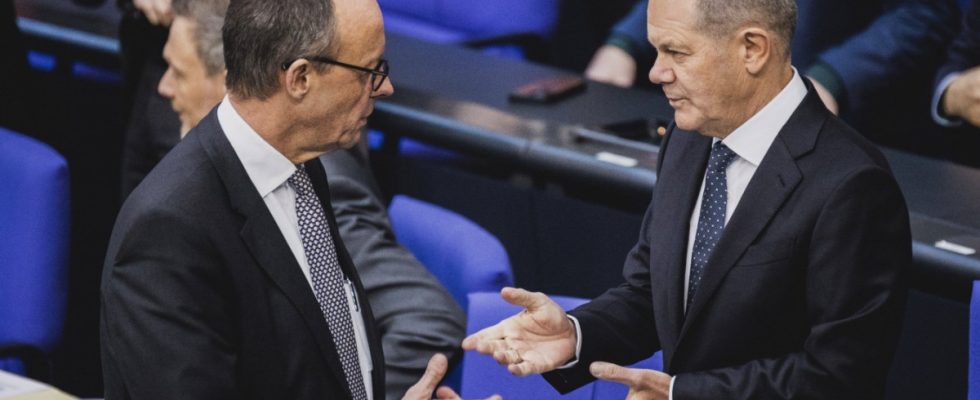The atmosphere was relaxed after the migration summit on Friday evening in the Berlin Chancellery. At the top-level meeting between Chancellor Olaf Scholz (SPD) and representatives of the federal states and opposition leader Friedrich Merz (CDU), there was apparently a rapprochement. “The Chancellor was very satisfied with the MPK’s decisions,” said Lower Saxony’s Prime Minister Stephan Weil (SPD) afterwards. “We have provided the blueprint,” said the Hessian Prime Minister and Chairman of the Prime Minister’s Conference, Boris Rhein (CDU), regarding the state resolutions and the summit. “The federal government, the states and the largest opposition party rate many points similarly,” wrote Scholz on Saturday on the platform X, the former Twitter. It was a “friendly and constructive exchange”.
But the morning after it becomes clear that there are still problems on many issues, especially in the relationship with the Union at the federal level. At the meeting, Merz also presented the Chancellor with a catalog of a total of 26 demands from the CDU and CSU parliamentary groups, which are hardly acceptable for Olaf Scholz and his traffic light government. The three-page paper is on the South German newspaper before.
The Chancellor can see the first point as an affront
The letter entitled “Germany Pact: Measures to Limit Illegal Migration” goes far beyond the states’ demands. The Chancellor can see the first point as an affront. Scholz should signal in a government statement that the country’s absorption capacity has been exhausted. The Union also calls for a common understanding that “with a view to the integration infrastructure and social cohesion, asylum immigration can be tolerated up to a maximum of 200,000 people per year.” In other words: The traffic light government should also publicly represent a kind of upper limit.
The Union also demands that visas should only be issued to nationals of a state if it is prepared to take back rejected asylum seekers. People who have already applied for asylum and been registered in other EU countries should be more consistently rejected at EU internal borders. The Union faction demands that they should only receive social benefits in the state in which they were registered.
The CDU and CDU are once again calling for the “introduction of stationary border controls to Poland, the Czech Republic and Switzerland as appropriate to the situation” as well as the establishment of special return centers and transit zones in which accelerated procedures are to be carried out at the national border for asylum seekers with little prospect of staying. For rejected asylum seekers who cannot be deported and people in the asylum procedure, a level of social benefits below the level of citizen’s benefit should be introduced. The Union is also once again calling for Algeria, Morocco, Tunisia and India to be classified as safe countries of origin.
While the federal and state governments apparently came closer together at the meeting, it is ruled out that the traffic light government wants to fulfill this list of demands. All three coalition partners strictly reject the introduction of an upper limit. Interior Minister Nancy Faeser (SPD), as well as leading interior politicians from the FDP and the Greens, had always strictly rejected such Union plans. The Greens reject the expansion of safe countries of origin, citing the difficult human rights situation in Tunisia.
What is more important is that Scholz and the states come to an agreement
However, what is more important than an agreement between traffic lights and the Union for a solution to the migration debate is that Scholz and the states agree on a common line. In many respects they are responsible for the practical implementation of migration policy. Because of the politically sensitive migration debate, Scholz had proposed a “Germany Pact” in which the federal government, states, local authorities and the opposition should pull together if possible. According to government circles, the catalog presented by the Union was not discussed in depth at the meeting.
Decisions should now be prepared by the federal-state meeting on November 6th. Until then, open questions will be discussed, announced Chancellor Scholz. This primarily includes the question of whether the federal government will transfer more money to states and municipalities to accommodate and care for refugees.

